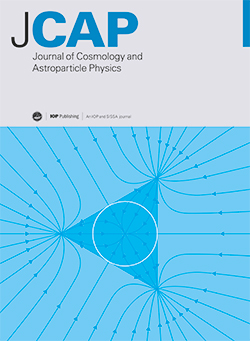A single-bubble source for gravitational waves in a cosmological phase transition
IF 5.3
2区 物理与天体物理
Q1 ASTRONOMY & ASTROPHYSICS
Journal of Cosmology and Astroparticle Physics
Pub Date : 2024-08-25
DOI:10.1088/1475-7516/2024/08/039
引用次数: 0
Abstract
We show that quantum fluctuations of an expanding phase transition bubble give rise to gravitational wave (GW) emission, even when considering a single bubble, without bubble collisions or plasma effects. The ratio of GW energy to the total bubble energy reservoir increases with time as ∝ t. If the bubble expands for long enough before percolation destroys it, back-reaction due to the GW emission becomes important after tbr ~ (16π5)mpl2R03, where R0 is the bubble nucleation radius and mpl is the reduced Planck mass. As seen by experiments today, the GW energy spectrum would appear blue. However, simple estimates suggest that the signal falls short of detection by even ambitious future experiments.宇宙学相变中的引力波单泡源
我们证明,即使考虑单个气泡,在没有气泡碰撞或等离子体效应的情况下,膨胀相变气泡的量子波动也会引起引力波(GW)发射。如果气泡在渗流破坏之前膨胀了足够长的时间,那么在 tbr ~ (16π5)mpl2R03 之后,引力波发射引起的反作用力就会变得非常重要,其中 R0 是气泡成核半径,mpl 是还原普朗克质量。正如今天的实验所看到的,全球瓦能谱将呈现蓝色。然而,简单的估计表明,即使是雄心勃勃的未来实验,也无法探测到这一信号。
本文章由计算机程序翻译,如有差异,请以英文原文为准。
求助全文
约1分钟内获得全文
求助全文
来源期刊

Journal of Cosmology and Astroparticle Physics
地学天文-天文与天体物理
CiteScore
10.20
自引率
23.40%
发文量
632
审稿时长
1 months
期刊介绍:
Journal of Cosmology and Astroparticle Physics (JCAP) encompasses theoretical, observational and experimental areas as well as computation and simulation. The journal covers the latest developments in the theory of all fundamental interactions and their cosmological implications (e.g. M-theory and cosmology, brane cosmology). JCAP''s coverage also includes topics such as formation, dynamics and clustering of galaxies, pre-galactic star formation, x-ray astronomy, radio astronomy, gravitational lensing, active galactic nuclei, intergalactic and interstellar matter.
 求助内容:
求助内容: 应助结果提醒方式:
应助结果提醒方式:


